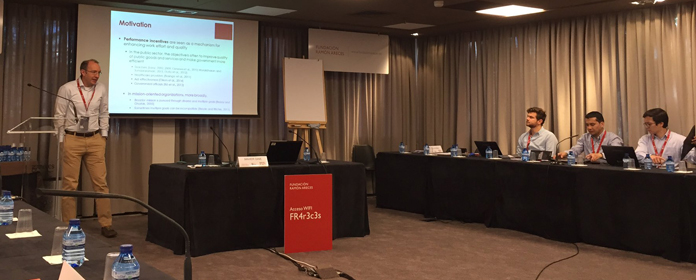Performance incentives in development organizations and redistributive policies, some of the topics of the morning sessions of the VI NCID Research Workshop.
Other issues such as the effects of rising oil prices on oil producing regions and neighboring areas or the impact of training on interpersonal skills in the workplace have also been addressed. work

PHOTO: Alberto Cendoya
Experts from international institutions such as the World Bank, Oxford University and King's College London have discussed poverty and development at framework of a scientific meeting organized in Madrid by the Navarra Center for International Development (NCID) of the University of Navarra and the Ramón Areces Foundation. Institute for Culture and Society of the University of Navarra and the Ramón Areces Foundation.
The first session of the workshop was entitled 'Benefits and mission statement: performance incentives in a multi-objective development organization' and was presented at position by Xavier Giné, from group of research of development of the World Bank.
In his speech, Giné explained that the impact of pay for performance in institutions with multiple objectives depends on the Degree complementarity between the tasks performed to achieve each of these goals.
Presented a work conducted among employees of a microcredit-focused development institution who were randomly assigned to one of two discount programs: credit and social. The study found that discount of credit improved outcomes related to credit , but was negative for mission statement. In contrast, social discount provided a boost to mission statement without compromising the microcredit program. The study concluded that a fixed salary is the optimal contract if the institution is concerned about both sustainability and its mission statement.
This was followed by Sanjay Jain of Oxford University (UK) with discussion paper 'Redistribution promises, transfers to special interests and the Economics politics of reform with limited state capacity'.
From agreement with Professor Jain, an underlying question in the political Economics is why economic policies aimed at improving efficiency are often politically difficult to adopt. In his talk he outlined a work that examines how the presence of special interest groups - on the one hand - and limited taxing capacity on the part of the state - on the other - influence the subject of redistributive policies to be supported by the people who potentially stand to lose from them.
Voters recognize that the government, by compensating those who lose out, has an incentive to misuse this redistributive mechanism: to direct the compensation disproportionately to its supporters or to other special interest groups. The analysis suggests that this is particularly detrimental in countries with leave state capacity, where popular support for the adoption of efficiency-enhancing reforms is likely to be the lowest.
Experts from universities in Switzerland and the USA.Roland Hodler from the University of St. Gallen (Switzerland) then spoke on 'Oil and Child Health in Nigeria'. The study he presented dealt with the impact of oil deposits at the local level in Nigeria on the development . It used data from geolocated surveys to create various indicators of development and poverty within and outside the oil regions.
It was found that the increase in the international price of oil tends to hurt communities in oil-producing regions relative to other areas, which is evidence of the damage at the local level in Nigeria. These negative effects do not spill over to neighboring localities. However, there is evidence that they do experience some positive repercussions of higher oil prices.
The last session of the morning was given by Achyuta Adhvaryu, University of Michigan (USA). It focused on 'The skills to pay the bills: return to training on interpersonal skills in place at work'.
From agreement with researcher, the willingness of companies to provide training to workers depends on how it impacts on increasing productivity and the likelihood that workers will stay with the company. The above study looked specifically at how training impacts on female garment workers in Bengaluru (India) in terms of interpersonal skills in the workplace work.
It was found that despite a high turnover rate, more female workers who received training continued at business during the training period, although the difference disappeared when the training period was completed. In addition, these employees were 12% more productive.
Putting the estimates and costs of the program together, the net return on training in interpersonal skills for female workers is estimated to be large: about 250% nine months after completion.




